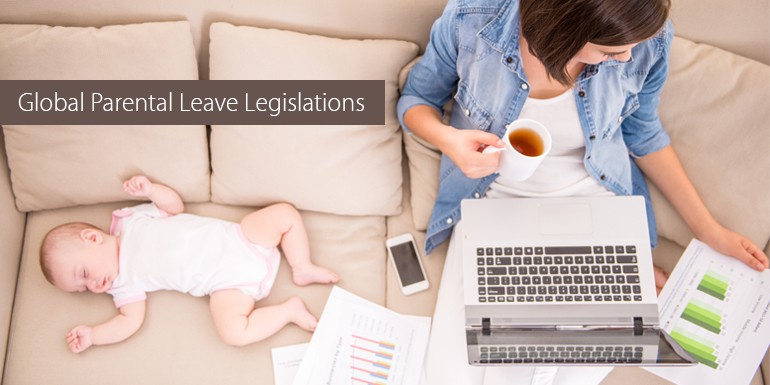

There is almost a silent revolution happening across many countries of the world. Most countries are revisiting their parental leave legislations to ensure that parents get to spend as much time as possible with their infants without the fear of losing out on their organizational remuneration or scope for professional growth. From an organizational point of view, this transformation would mean implementing specific changes that ensure compliance with the amended legislations and planning to compensate for leave coverage. But from an end-to-end HCM solution point of view, this change reflects the need to create country-specific and flexible rules in the system.
Why is parental leave legislation an important aspect of Payroll?
Parental leave and employment laws differ vastly from country to country. Hence, organizations aiming at expanding their operations across the globe must, in addition to assessing other factors, take into consideration country-specific parental leave rights of their employees, since these regulations reflect the country’s policies regarding equality in the workplace.
For example, European countries consider paid maternity leave as an investment for their countries’ economies. Offering paid maternity leaves create job security for mothers, thereby promoting the economic growth of the country. Many countries are also recognizing the value of paternity leaves in ensuring satisfaction and personal growth of employees.
Let’s take a peek at some recent developments related to maternity and paternity leaves in some of the countries.
Country-specific changes in parental leave legislation
India
The Maternity Benefit (Amendment) Bill, 2016, includes amendments to specific provisions of the Maternity Benefit Act, 1961.
The key updates to the act include
- The duration of paid maternity leaves: increases to 26 weeks (from 12 weeks); however, a women with two or more surviving children is entitled to receive 12 weeks of paid maternity leave.
- Paid adoption leave: this category of leave is for 12 weeks from the date the child is handed over to the parent(s), provided the child is younger than 3 months.
- Crèche facilities at organizations: Organizations with 50 or more employees must organize crèche facilities with about 4 visits permitted to the mother per day.
Singapore
As per the latest legislation, single mothers would soon be entitled to avail all the maternity leave benefits – including 16 weeks of statutory paid leave. These benefits were initially available only to legally married women. This change is expected to take effect from early 2017.
Other changes include
- The duration of legitimate paternity leave will increase to at least 2 weeks for fathers of children born on or after January 1, 2017.
- The duration of shared parental leave will be increased from 1 week to 4 weeks for parents of children born on or after July 1, 2017. Shared leave days will however be deducted from the mother’s maternity leave, and sharing is subject to her permission.
- The duration of paid leave for adoption will also increase from July 1, 2017 – from 4 weeks to 12 weeks (if child is younger than 1 year).
- The legislation also allows eligible adoptive fathers to share 4 weeks of their spouse’s adoption leave.
Ireland
Ireland is among the last few countries of the European Union to adopt paternity leave. The Irish Parliament passed the Paternity Leave and Benefit Act, 2016, allowing fathers to avail 2 consecutive weeks of leave within 26 weeks of the birth or placement of the child (with effect from September 1, 2016). Employers are however not under obligation to pay their employees during the paternity leave.
New Zealand
As per the latest legislation, the benefits of paid paternity leave extend to many more categories of employees than earlier. Mothers are eligible to receive up to 18 weeks of payments instead of the standard 16 weeks.
United States
The current U.S. policy does not mandate paid maternity leave. Hence parental leave regulations vary across the various cities and states of the country. High-end organizations do provide paid maternal leave packages.
United Kingdom
In 2015, United Kingdom acknowledged the importance of encouraging broader parental leave policies and, with effect from April 2015, they introduced shared parental leave and pay.
Conclusion
This short overview of the diverse parental legislations across most of the countries of the world is proof of the extent of country-specific variances that organizations must consider and understand before expanding their operations.
Even within countries where they have already established their operations, organizations need to ensure that they are up to date on the latest amendments. They need to consider the repercussions of changes to maternity and paternity leaves on workforce management and employee budget forecast. They must also focus on the administrative aspects of managing revised legislations – for example, communicating the implications of such revised regulations before implementing the changes.
For industries and HR, the right technology can support, scale, and minimize risk. It can enable the HR department to focus on key strategic areas, as the rest of the processes are enabled at the back end by technologies. Ramco HCM offers multi-country payroll across 35+ countries, many of which have recently witnessed new developments or made amendments to parental acts (e.g., India, Singapore, and New Zealand). Dedicated resources at Ramco study and evaluate organizational impacts of new or changes to existing acts. We ensure that our Payroll software are up to date and compliant with the relevant legislations and regulatory requirements. These timely updates help organizations to focus on other operational aspects instead of worrying about potential changes required to comply with changing regulations.
Developing country-specific parental leave policies and monitoring compliance with local laws is indeed a herculean task, but with the right support, all the associated hurdles during implementation can be easily managed.
Frequently Asked Questions (FAQs)
Enterprise asset management (EAM) involves the management of mission critical assets of an organization throughout each asset's lifecycle. EAM is used to plan, optimize, execute, and track the needed maintenance activities with the associated priorities, skills, materials, tools, and information. The aim is to optimize the quality and utilization of assets throughout their lifecycle, increase productive uptime and reduce operational costs.
Enterprise asset management (EAM) involves the management of the maintenance of physical assets of an organization throughout each asset's lifecycle. EAM is used to plan, optimize, execute, and track the needed maintenance activities with the associated priorities, skills, materials, tools, and information.
The software helps in effective maintenance of assets through preventive, predictive, shutdown and breakdown maintenance strategies. The system also helps enterprises mitigate equipment risks by enhanced safety standards. The streamlined operations and improved asset performance helps organizations increase their investment effectiveness.
EAM is important because it helps organizations track, assess, manage and optimize asset quality and reliability. Asset intensive Organizations have hundreds, thousands, even millions of assets which needs to be maintained to maximize / optimize life of these assets to increase the return on investment.
The key features of effective EAM are:
- Work management.
- Maintenance Strategies (Preventive/ Predictive / Breakdown / Shutdown).
- Planning and scheduling.
- Supply chain management.
- Health and safety.
- Mobility.
- Analytics.
- Improved Asset Health at reduced cost through data driven maintenance Programs
- Complete visibilityon entire maintenance data across Equipment, across Models, across Branches to aid in analysis & decision making such as to Repair or Replace the Equipment
- Insightful analysis of Inspection Data to improve customer satisfaction
- Effective maintenance management enhanced by predictive maintenance and inbuilt analytics
- Increased reliability and safety, keeps complete track of all the inspections & calibration schedules
- Mobile Application enables users to execute work while “in the field” leading to minimized non-productive time and increased productivity and reduces duplication of work and human errors in recording information.
- Quick turnaround time through Actionable Notification & Alerts for every process in real time and accessible anytime and anywhere.
- Improved Regulatory Part of asset management involves the implementation of better O&M practices, which can significantly improve compliance.
Asset Intensive companies under the following Industries :
- Ports
- Cement and Mining
- Utilities
- Fleet Maintenance
- Equipment Rental
- Other Manufacturing
- Real Estate & Infrastructure
- Power Generation
Contact us for a meeting and schedule a demo
This differs on case to case basis, based on the type of installation and unique industry specific requirements. Contact us for a meeting and schedule a demo.
This differs on case to case basis, based on the type of installation and unique industry specific requirements. Contact us for a meeting and schedule a demo.
Stay Connected, follow us on LinkedIn / Twitter to know more about EAM Software latest trends.


